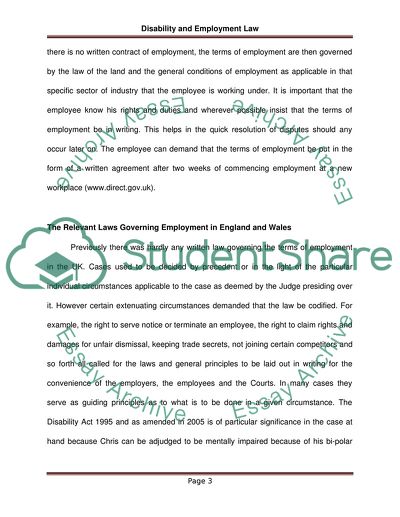Cite this document
(“Identify and discuss all of the relevant employment law issues raised Research Paper”, n.d.)
Identify and discuss all of the relevant employment law issues raised Research Paper. Retrieved from https://studentshare.org/law/1590934-identify-and-discuss-all-of-the-relevant-employment-law-issues-raised-in-the-above-scenario-what-advice-would-you-give-to-chris-be-sure-to-substantiate-your-answer-by-reference-to-decided-cases
Identify and discuss all of the relevant employment law issues raised Research Paper. Retrieved from https://studentshare.org/law/1590934-identify-and-discuss-all-of-the-relevant-employment-law-issues-raised-in-the-above-scenario-what-advice-would-you-give-to-chris-be-sure-to-substantiate-your-answer-by-reference-to-decided-cases
(Identify and Discuss All of the Relevant Employment Law Issues Raised Research Paper)
Identify and Discuss All of the Relevant Employment Law Issues Raised Research Paper. https://studentshare.org/law/1590934-identify-and-discuss-all-of-the-relevant-employment-law-issues-raised-in-the-above-scenario-what-advice-would-you-give-to-chris-be-sure-to-substantiate-your-answer-by-reference-to-decided-cases.
Identify and Discuss All of the Relevant Employment Law Issues Raised Research Paper. https://studentshare.org/law/1590934-identify-and-discuss-all-of-the-relevant-employment-law-issues-raised-in-the-above-scenario-what-advice-would-you-give-to-chris-be-sure-to-substantiate-your-answer-by-reference-to-decided-cases.
“Identify and Discuss All of the Relevant Employment Law Issues Raised Research Paper”, n.d. https://studentshare.org/law/1590934-identify-and-discuss-all-of-the-relevant-employment-law-issues-raised-in-the-above-scenario-what-advice-would-you-give-to-chris-be-sure-to-substantiate-your-answer-by-reference-to-decided-cases.


